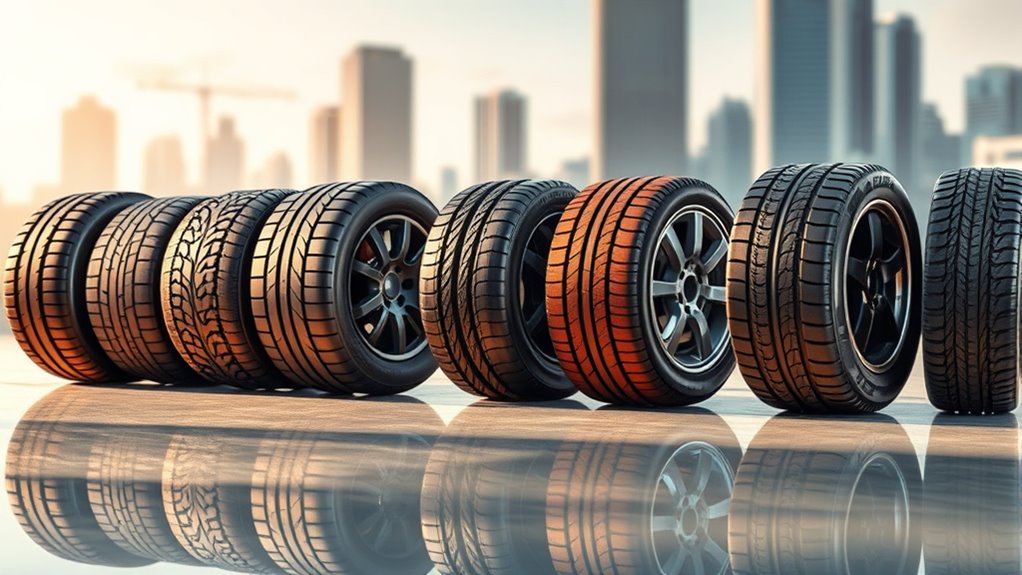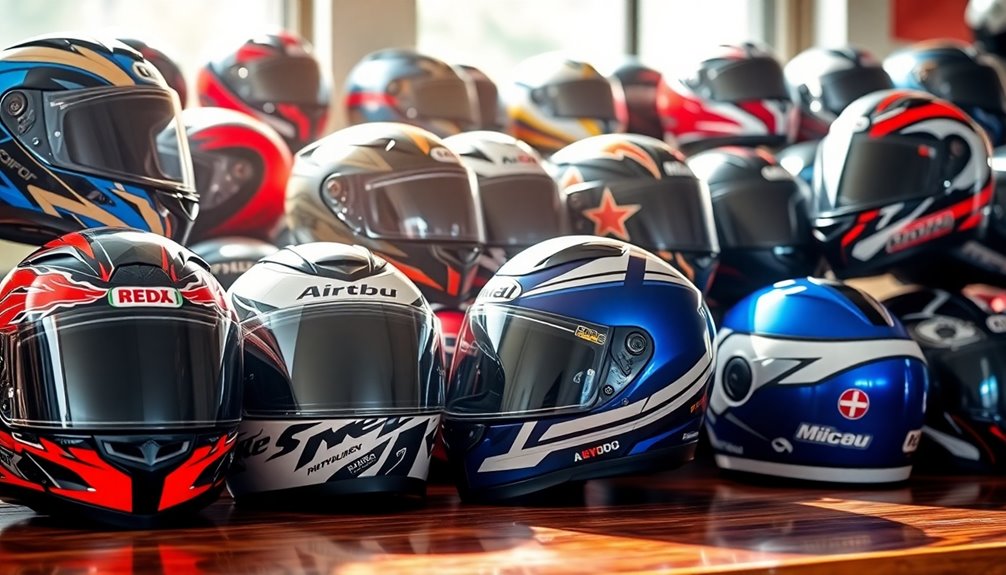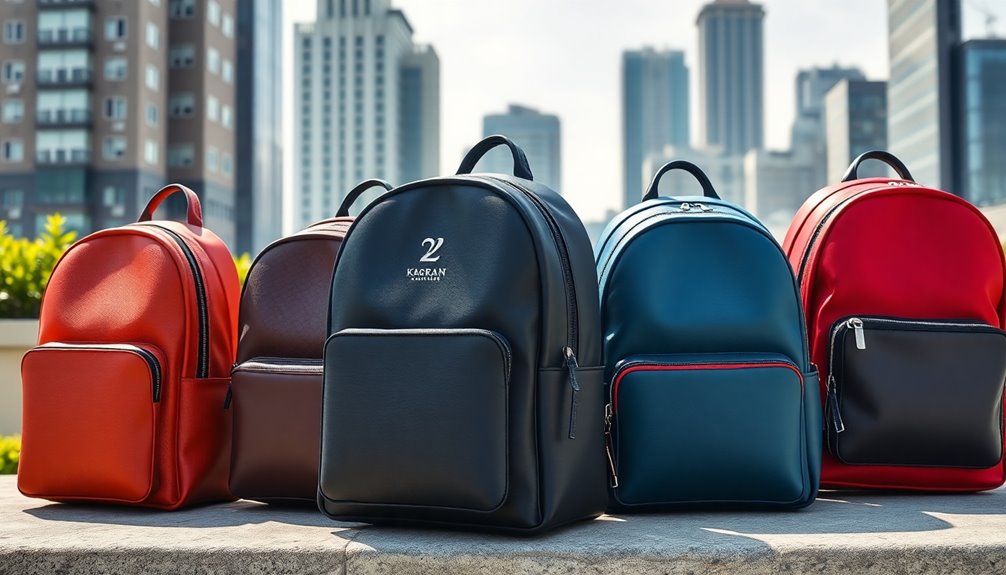Korean tire brands are making waves in the market, with Hankook, Kumho, and Nexen standing out as the top performers. Hankook leads with a significant market share and innovative technologies aimed at electric vehicles. Kumho's focus on premium offerings and Nexen's advancements in tire materials highlight their competitive edge. Each brand is actively expanding globally, enhancing their production capabilities. If you're curious about their specific strategies and future projections, you'll find more insights ahead.
Key Takeaways
- Hankook, Kumho, and Nexen are the leading Korean tire brands, with Hankook commanding a 38.8% market share in South Korea.
- Hankook achieved over $6.4 billion in revenue in 2024, demonstrating strong global sales performance.
- Kumho is diversifying its offerings with the launch of an EV-exclusive tire brand called EnnoV.
- Innovative technologies like Hankook's low-noise EV tires and Nexen's Nano-Technology enhance tire performance and sustainability.
- Strategic expansions in manufacturing capacity and partnerships with automakers bolster the global presence of Korean tire brands.
Overview of the Korean Tire Market
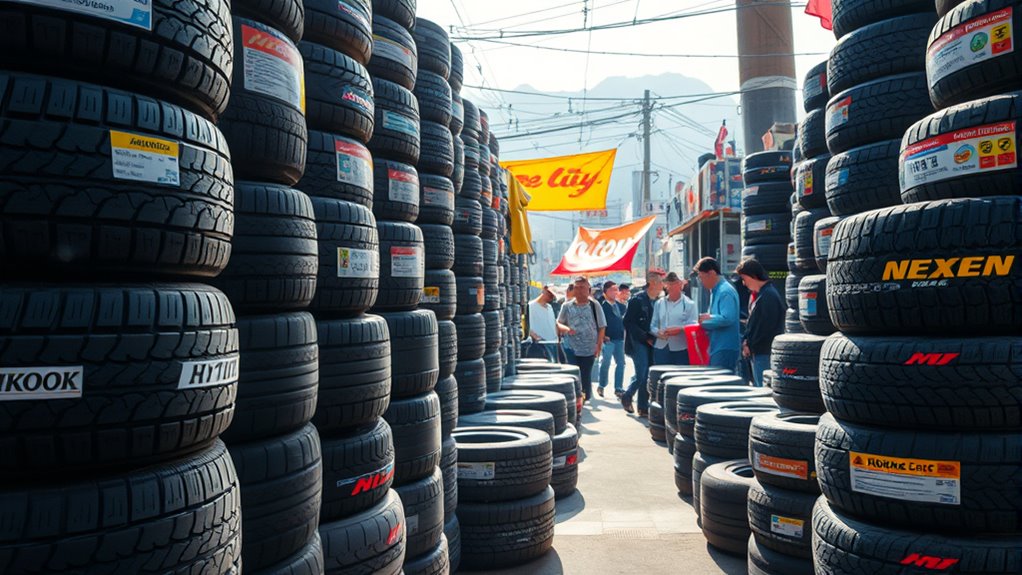
The Korean tire market is a dynamic sector, valued at approximately USD 3.94 billion in 2022. You'll find it growing steadily, with a projected CAGR of 5.31% from 2023 to 2029, reaching around USD 5.62 billion. This growth stems from increased automobile production and exports, along with technological advancements. Segmentation plays a key role, as the market caters to various vehicle types, including passenger cars and commercial vehicles, focusing heavily on radial tires. The demand for tires splits between OEM and replacement categories. Additionally, supportive government initiatives and the rise of electric vehicles are shaping market trends. The market is also experiencing a significant growth due to the rising demand for both passenger and commercial tires. Furthermore, the integration of predictive modeling in tire manufacturing can enhance efficiency and optimize production processes. Notably, the rise of sustainable and eco-friendly options in tire production is also influencing consumer preferences and market dynamics.
Leading Brands: Hankook, Kumho, and Nexen
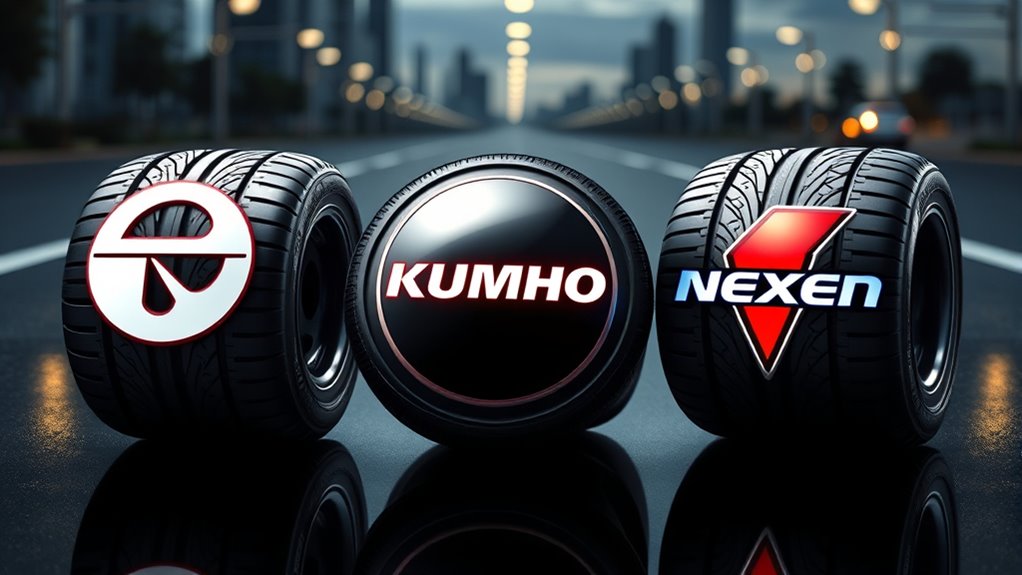
When it comes to leading Korean tire brands, Hankook, Kumho, and Nexen stand out with their strategic market positioning and innovative product offerings. You'll find that each company is focused on enhancing their premium portfolios while also expanding production capabilities to meet rising demand. In fact, Hankook achieved over $6.4 billion in revenue during 2024, reflecting their strong market performance. As part of their growth strategy, these brands are increasingly considering ESG considerations to align with shifting consumer preferences. Furthermore, their commitment to diversification allows them to mitigate risks associated with market fluctuations. Let's explore how these brands are shaping the tire industry in South Korea and beyond.
Market Positioning Strategies
As tire manufacturers navigate a competitive landscape, market positioning strategies become essential for success, particularly for leading brands like Hankook, Kumho, and Nexen.
Hankook dominates the South Korean market, holding a substantial 38.8% share and targeting men aged 25-54 in the U.S. through effective brand messaging that emphasizes "driving emotion." Notably, Michelin's market position reinforces the importance of premium strategies in gaining consumer loyalty. Additionally, strong communication skills in marketing campaigns can significantly enhance brand perception and consumer connection. Moreover, effective retirement planning can provide financial security for consumers, influencing their purchasing decisions.
Meanwhile, Kumho is diversifying its sales channels to enhance earnings and plans to launch an EV-exclusive tire brand, EnnoV, tapping into the growing electric vehicle market.
Both brands face fierce competition from foreign giants like Michelin and Bridgestone, pushing them to expand production globally and strengthen their presence to maintain market relevance and drive sustainable growth.
Innovative Product Offerings
With market positioning strategies firmly in place, leading Korean tire brands like Hankook, Kumho, and Nexen are now turning their attention to innovative product offerings that set them apart in a crowded marketplace.
You'll find impressive advancements that cater to modern driving needs:
- Hankook's iON INNOVATIVE TECHNOLOGY enhances EV tires with low noise and high mileage.
- Kumho's EnnoV Brand is launching EV-exclusive tires featuring premium attributes.
- Nexen's Nano-Technology improves overall tire performance through innovative materials.
- Hankook's Runflat System (HRS) guarantees performance even post-puncture.
- Nexen's V-Shaped Directional Tires provide superior handling and traction.
These innovations not only enhance safety but also improve your driving experience, making these brands leaders in the tire industry. Furthermore, Hankook's commitment to driver safety ensures that all developments prioritize the well-being of users on the road. In addition, creating a comfortable and safe driving environment is essential for enhancing quality of life while on the road. Notably, tire performance can be further enhanced through suspension upgrades that improve handling and comfort in various driving conditions.
Sales Performance and Revenue Growth
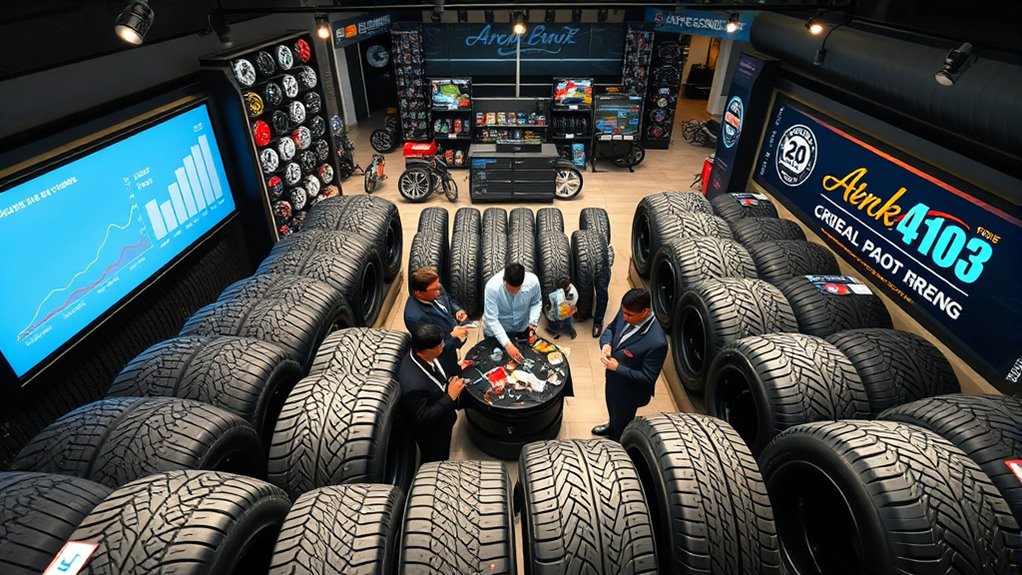
When you look at the sales performance of Korean tire brands, you'll notice record global sales driven by a strong demand for premium tires. Increased operating profits reflect the success of strategic initiatives and market expansion efforts. Notably, global consolidated sales reached $1.782 billion in Q2 2024, showcasing the resilience of these brands amidst economic challenges. Additionally, fluctuations in currency values can significantly impact the profitability of these brands in international markets. Furthermore, understanding the state tax implications of various regions can be crucial for brands looking to optimize their financial strategies. As you explore this topic, consider how these factors are shaping the future of the tire industry.
Record Global Sales
Hankook Tire achieved record global sales in 2024, demonstrating resilience amid economic challenges.
You'll be impressed by their performance, with consolidated sales reaching KRW 9.4119 trillion, a 5.3% increase from last year. This remarkable achievement reflects a strong growth mindset that drives continuous improvement within the organization. Additionally, the company has shown a commitment to good grief strategies, ensuring employee well-being during challenging times.
Key factors contributing to this success include:
- A notable 32.7% rise in operating profit, reaching KRW 1.7622 trillion.
- A strong focus on high-value-added products driving profitability.
- The effective "First Mover" strategy adapting to market changes.
- Expansion in high-inch tire sales, particularly in China and North America.
- Efficient operations across eight global manufacturing facilities.
- The company also strengthened its OET supply to premium automotive brands, enhancing its market position.
This impressive growth showcases Hankook's ability to navigate economic downturns and position itself as a leader in the tire market.
Premium Tire Demand
As consumer preferences increasingly lean toward SUVs and luxury sedans, Korean tire manufacturers are pivoting their strategies to capitalize on the growing demand for premium tires.
Companies like Kumho Tire are enhancing their product portfolios, focusing on larger tires that yield higher margins. In fact, tires over 18 inches are in high demand, with Kumho reporting a 4.6% sales growth in Q1 2024 driven by these premium offerings. Analysts predict continued robust earnings in Q2 due to solid demand in Europe and North America, as culturally intelligent leaders adapt their strategies to meet diverse market needs. Additionally, the company's emphasis on tax advantages associated with premium tire investments may further bolster their financial position.
Hankook is also making strides by supplying original equipment tires to over 280 premium vehicle models, while planning to boost EV tire sales to 25% of revenue by next year.
With strong regional demand in Europe and North America, premium tires are shaping a lucrative future for Korean tire brands.
Operating Profit Increases
The focus on premium tire demand has greatly influenced the operating profit landscape for Korean tire manufacturers. This trend has led to impressive results for some brands while others face challenges.
Here's how the market's shifting dynamics are shaping profits:
- Hankook Tire reported a 32.7% increase in operating profit, reaching 1.76 trillion won in 2024.
- Kumho Tire achieved a staggering 167% growth in Q1 2024 compared to last year.
- Nexen Tire, however, saw a 25% drop in operating profit due to rising shipping costs.
- High-value products are driving profitability, despite market fluctuations. Predictive analytics can also help companies anticipate market trends and consumer demands. Additionally, the emphasis on sustainable travel is influencing consumer preferences, leading to increased demand for eco-friendly products.
- Hankook's global presence, supplying tires for around 280 models, enhances its revenue growth prospects.
- The company's operating profit rate target is set to remain above 10%, supporting its financial stability.
These factors highlight the varying paths of success among Korean tire brands.
Premium Tire Focus and Market Strategy
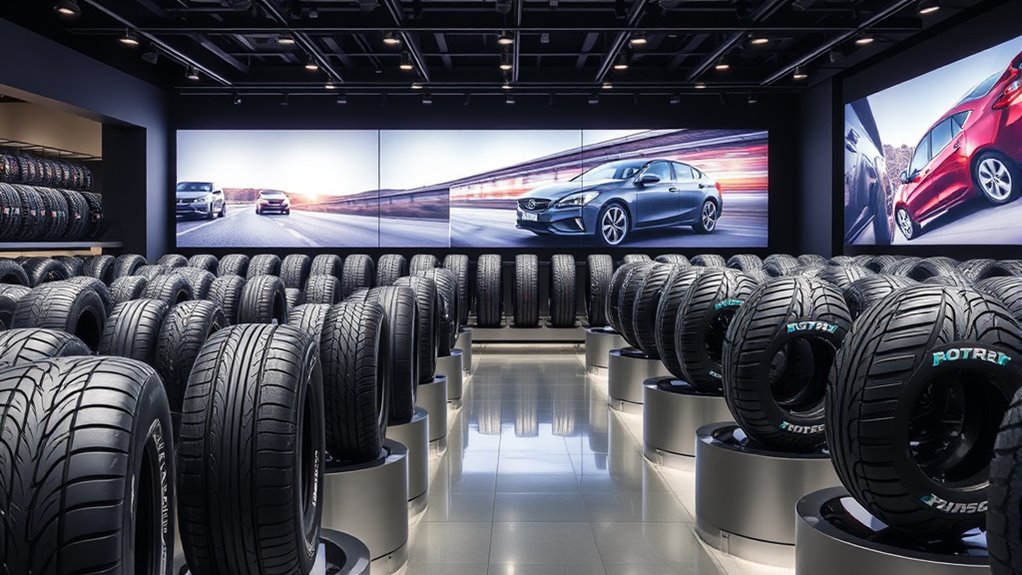
While many tire manufacturers are vying for market share, Korean brands are carving out a significant niche in the premium tire segment.
Hankook leads with a 38.8% market share, focusing on high-end tires that cater to the growing demand for SUVs and luxury sedans. You'll notice that larger tires, especially those over 18 inches, offer higher profit margins, making them a strategic target for growth. Additionally, as of April 2024, Hankook's 38.8% market share solidifies its status as the top performer in the South Korean tire industry. Establishing clear savings goals can also help companies like Hankook plan for future investments. Moreover, high-quality content can enhance brand trust and loyalty, further supporting Hankook's premium positioning in the market.
Kumho's recent plant expansion in Vietnam aims to boost production capacity, while Nexen sets ambitious sales goals for bigger tires.
By forging partnerships with premium automakers, Hankook strengthens its brand positioning.
Electric Vehicle Tire Innovations
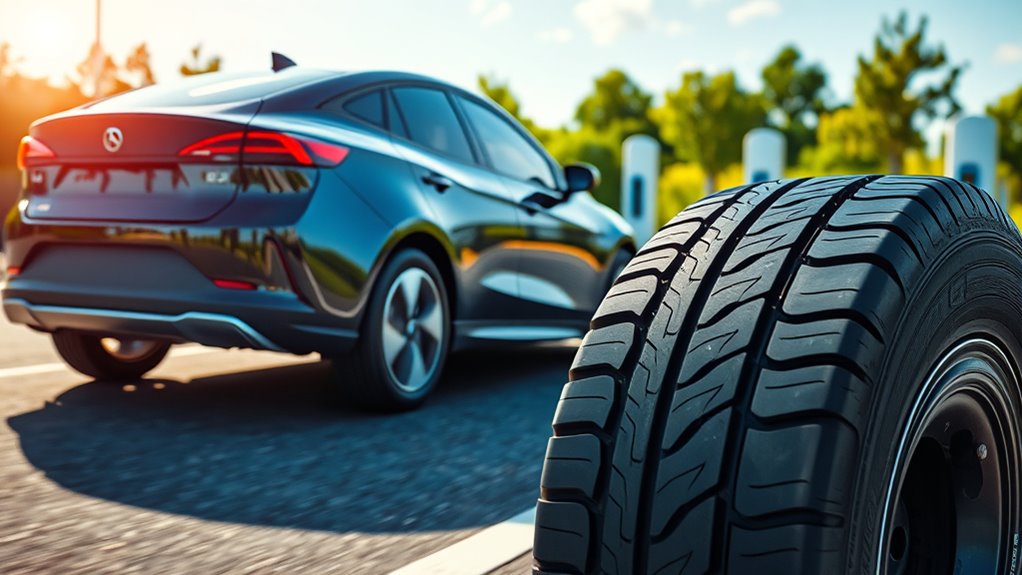
With the rise of electric vehicles (EVs), tire innovations are rapidly evolving to meet new demands.
Korean tire brands like Hankook, Kumho, and Nexen are leading the charge with groundbreaking technologies. Their focus on electric vehicle tires emphasizes:
- Noise Reduction: Essential for quiet EVs, utilizing innovative sound-absorbing materials. Freshly squeezed juices, like orange juice, typically last only 2-3 days, highlighting the importance of freshness in products.
- Durability: Designed to withstand the added weight of heavy batteries.
- Performance Enhancements: Improved driving stability and longevity.
- Lightweight Construction: Reducing rolling resistance for better efficiency, which is crucial for maintaining high performance in electric vehicles.
- Advanced Grip: Enhanced traction for safety during various driving conditions.
Hankook's iON brand exemplifies these innovations, offering a significant competitive edge in the growing EV tire market and demonstrating a commitment to quality and performance. The iON tires are particularly notable for their up to 18% reduction in cabin noise, showcasing the brand's dedication to enhancing the overall driving experience for electric vehicle users.
Advancements in Material Technology
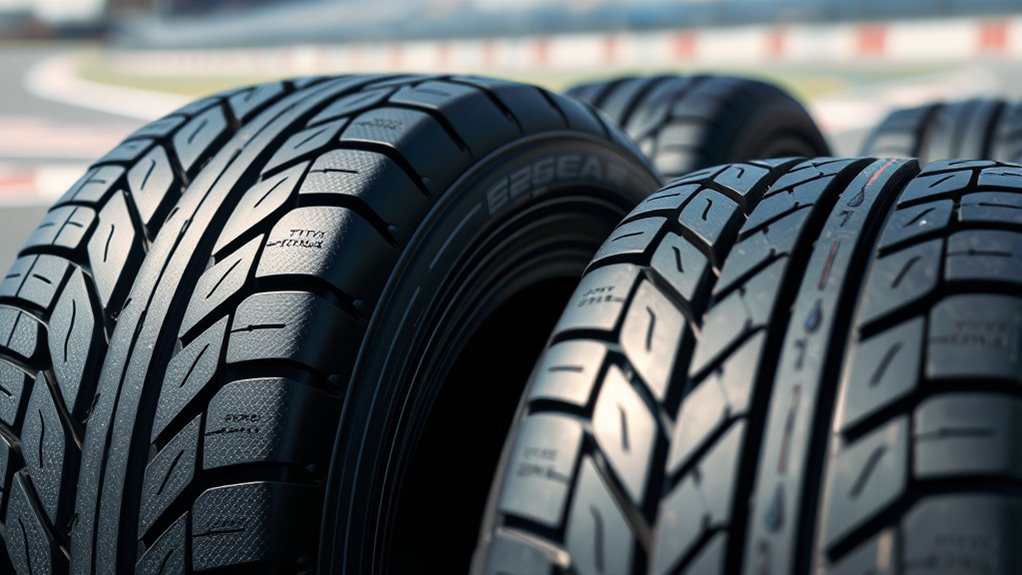
As tire manufacturers aim for enhanced performance and sustainability, advancements in material technology are becoming essential.
South Korean companies are leading the charge with innovations like chemically recycled PET, which you'll find in products from Hankook Tire and Hyosung Advanced Materials. Their high-strength tire cords made from recycled materials boost durability while maintaining quality even after multiple recycling cycles. Many consumers are also turning to natural sweetening alternatives in their diets, reflecting a broader trend towards health-conscious choices. The incorporation of omega-3 sources in food is also gaining popularity among health enthusiasts.
South Korean firms are pioneering innovations in tire technology with high-strength, chemically recycled PET materials, enhancing durability and sustainability.
The iON tire model stands out, incorporating 45% sustainable materials and earning the ISCC Plus certification. Collaborative efforts between manufacturers and material suppliers drive these advancements, while Hankook aims for 100% sustainable materials by 2050. This partnership highlights the importance of recycled PET materials in the tire manufacturing process.
With the rising demand for eco-friendly products, these innovations reflect a significant shift toward sustainability in the tire industry.
Design Innovations for Enhanced Safety
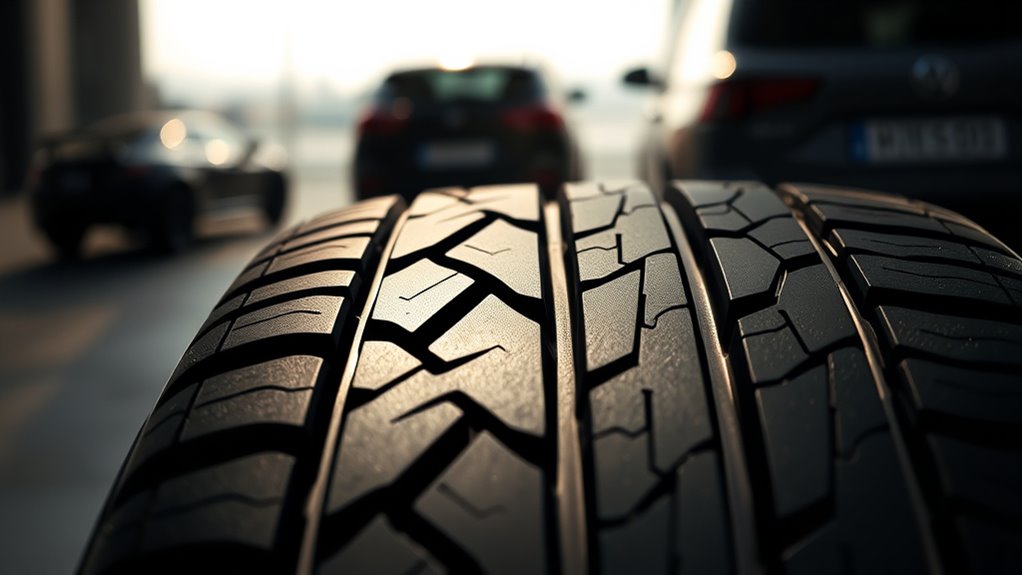
Design innovations in the tire industry are essential for enhancing safety on the road.
Korean tire brands are leading the way with several cutting-edge features designed for your protection. Here are some key innovations:
- 3D Siping Technology: Improves traction on wet and dry surfaces.
- Snow Ejector Systems: Prevents snow from trapping in tires.
- Real-Time Monitoring: Tracks tread wear and road conditions with ease.
- Adaptive Tread Patterns: Adjusts based on varying road conditions for ideal grip.
- Tire Wear Indicators: Innovative designs help you assess tread depth effortlessly.
These advancements not only elevate your driving experience but also greatly enhance overall safety, ensuring you stay secure on every journey. Furthermore, Kumho Tires' commitment to R&D results in continuous improvements in tire technology, further bolstering safety features.
Global Competition and Market Challenges
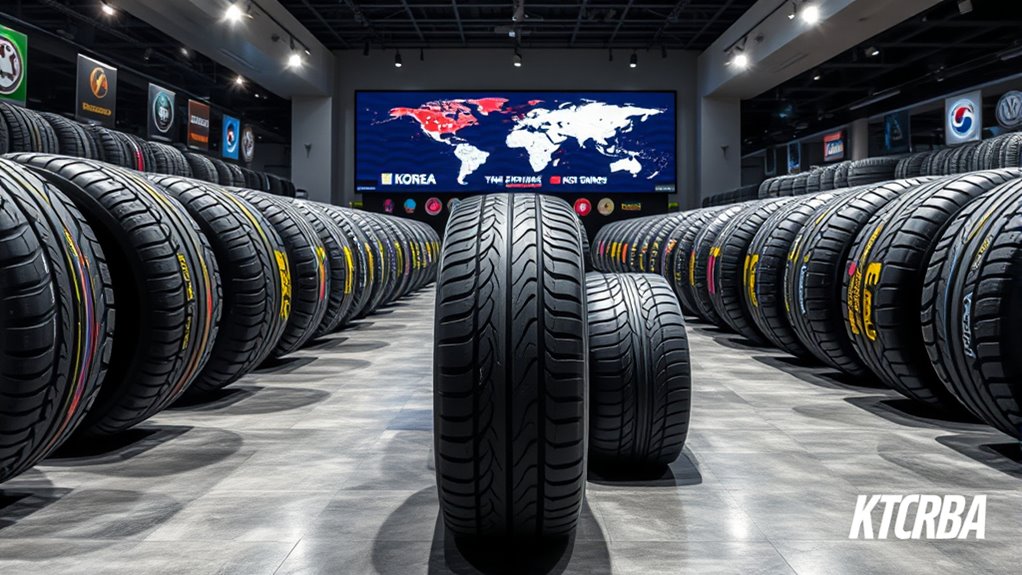
While Korean tire brands like Hankook, Kumho, and Nexen have carved out a significant space in the global market, they face stiff competition from established giants such as Michelin and Bridgestone.
Hankook, now the sixth largest tire manufacturer, shows impressive sales growth, yet market challenges persist. High tariffs previously impacted US exports, though recent reductions help. Operating profit increased by 15.5% year-on-year in 2020, showcasing Hankook's ability to adapt and thrive amidst adversity.
Hankook, the sixth largest tire manufacturer, experiences impressive growth amid ongoing market challenges and recent tariff reductions.
Supply chain disruptions from geopolitical tensions and inflation can slow demand for new vehicles, affecting tire sales. Additionally, keeping pace with technological advancements is essential.
You'll find that these brands must innovate continually to stay competitive, especially against well-established companies that dominate the market and possess significant brand recognition.
Future Growth Projections for Korean Brands

Given the robust growth trajectory of the Korean tire industry, you can expect significant advancements in the coming years. The market is set to reach USD 4.47 billion by 2025 and USD 6.17 billion by 2030, driven by several key factors:
- Growing automotive and EV markets
- Rising demand for premium and larger tires
- Competitive pricing among manufacturers
- Government initiatives supporting industry growth
- Investments in product innovation and R&D
As more consumers lean towards SUVs and electric vehicles, specialized products will gain traction. Additionally, the significant industrial growth and automotive industry expansion are expected to continue driving demand for tires. Major brands like Hankook and Kumho are poised to expand their offerings, ensuring they stay ahead in this evolving landscape. Expect innovation and profitability to define the future of Korean tire brands.
Strategic Expansion and Global Presence
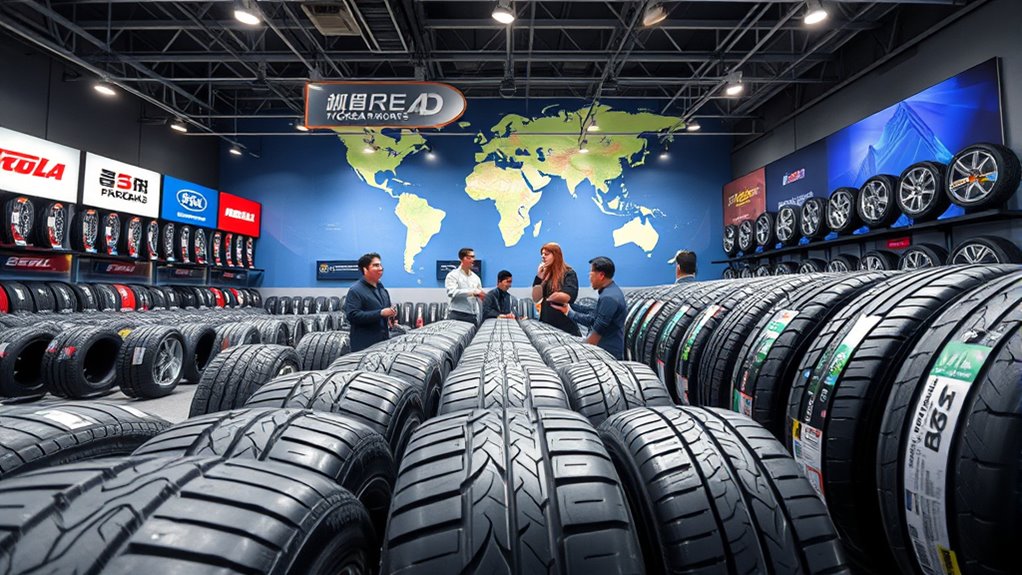
As you explore the strategic expansion of Korean tire brands, you'll notice a strong focus on boosting manufacturing capacity and forming international partnerships. These efforts are aimed at increasing market share and solidifying their global presence. Understanding these trends will give you insight into how these brands plan to compete in a rapidly evolving automotive landscape. In particular, the expansion plans by major manufacturers like Hankook and Nexen reflect their commitment to tapping into the growing demand for electric vehicle tires.
Manufacturing Capacity Growth
South Korean tire manufacturers are aggressively expanding their manufacturing capacity to strengthen their global presence and meet increasing consumer demand. This strategic growth focuses on enhancing production capabilities, particularly for high-performance and premium tires.
Here are some key developments:
- Nexen Tire plans to double its Czech Republic plant's output to 11 million tires by 2025.
- Hankook Tire is investing $1.6 billion in expanding its Tennessee facility for truck and bus tires.
- Kumho Tire's Vietnam plant production will rise from 6 million to 12.5 million tires annually.
- Companies are establishing facilities near key markets to reduce shipping costs.
- The goal is to boost production of larger, high-margin tires for SUVs and luxury vehicles. Additionally, Nexen Tire is set to become the world's largest tyre production facility for passenger vehicles and light trucks with its new factory in Gyeongnam Province, aiming for a significant increase in output.
International Partnerships Strategy
To enhance their global presence and meet evolving consumer needs, Korean tire brands are strategically forging international partnerships.
For instance, Hankook Tire collaborates with major automakers like BMW and Mercedes-AMG to develop tailored high-performance tires. These partnerships not only optimize tire performance for specific models but also involve joint research initiatives that drive technological advancements. Additionally, Hankook's emphasis on collaboration with leading automakers is crucial in addressing the global tire market needs.
By sponsoring events such as the Lamborghini Super Trofeo Asia Series, Hankook showcases its capabilities on a global stage. Collaborations with firms like BRABUS focus on enhancing electric vehicle performance, highlighting Hankook's commitment to innovation.
Through a robust global network and R&D centers, these partnerships facilitate market expansion and solidify Hankook's premium brand positioning worldwide, increasing brand awareness in diverse markets.
Market Share Trends
While maneuvering a competitive landscape, Korean tire brands are witnessing significant shifts in market share driven by strategic expansion and a strong global presence.
Hankook Tire leads with a commanding 38.8% market share in South Korea, closely followed by Kumho Tire at over 34%.
As these brands grow, consider the following trends:
- Local manufacturing is booming due to infrastructure investments.
- Tire exports increased by 4.9% in early 2024, especially to Europe.
- Companies invest heavily in R&D for innovative tire solutions.
- South Korean manufacturers sold nearly 45 million units globally in the first half of 2024.
- Strict regulations and raw material costs challenge local manufacturers. Additionally, the growing electric vehicle market is driving demand for high-performance tires, creating new opportunities for expansion.
These dynamics shape the competitive landscape, influencing future market strategies.
Frequently Asked Questions
What Are the Warranties Offered by Korean Tire Brands?
Korean tire brands offer several warranties to protect your purchase.
Nexen provides a limited warranty for 6 years from manufacture or 5 years from purchase, including a free replacement policy for the first 1.6mm of tread.
Kumho offers an impressive 85,000-mile treadwear warranty with road hazard service for the first 25% of wear.
Always make certain you follow installation and maintenance guidelines to keep your warranty valid and avoid exclusions.
How Do Korean Tires Compare in Quality to Other Brands?
When it comes to tires, think of Korean brands as the underdog with a fierce bite.
You'll find they often outshine competitors, blending quality with affordability like a master chef mixing spices. Brands like Hankook and Kumho consistently receive high marks for performance, durability, and innovation.
With advancements in technology and a diverse product range, you're likely to find a Korean tire that meets your needs without breaking the bank.
Where Can I Buy Korean Tires Online?
You can buy Korean tires online through various platforms.
Check out TradeKorea for used options starting at $6 per tire.
The Tire Shop specializes in Kumho tires, especially if you're in New York.
For a wider selection, visit TireHut, which offers Nexen tires for different vehicles.
Nexen Tire USA also has a range of products with warranties.
Don't forget to explore global marketplaces for more choices and direct purchasing options.
What Is the Average Lifespan of Korean Tires?
When you're considering Korean tires, you'll find they generally last between 50,000 and 70,000 miles. Factors like driving conditions, tire model, and vehicle usage influence their lifespan.
You should remember that proper maintenance—like regular rotation and pressure checks—can greatly extend their life. Plus, many brands back their products with warranties, showing their confidence in durability.
Are Korean Tires Suitable for All Weather Conditions?
Yes, Korean tires are suitable for all weather conditions.
They're designed with advanced tread compounds and full-depth sipes to provide excellent grip in both wet and dry conditions.
Many models, like those from Kumho, even carry the severe snow mark, ensuring reliable performance in harsh winters.
With options like Hankook's Kinergy, you'll enjoy a balanced ride quality, making them a dependable choice for year-round driving.
You won't be disappointed!
Conclusion
To sum up, the Korean tire market is thriving, with brands like Hankook, Kumho, and Nexen leading the charge. Did you know that Hankook's revenue reached over $6 billion in 2022, showcasing its strong market presence? As these companies focus on innovative designs and cater to the growing electric vehicle segment, they're well-positioned to tackle global competition. With strategic expansion plans, the future looks bright for Korean tire brands, promising quality and performance for drivers worldwide.
